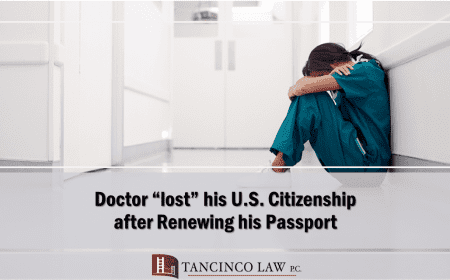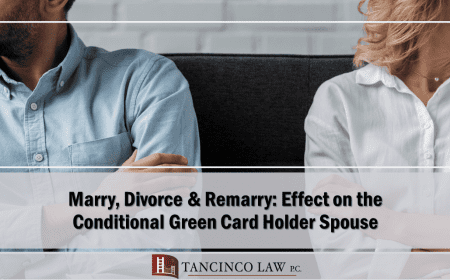As if the misery of losing a loved one is not enough grief for an immigrant spouse married to a US citizen, additional penalty awaits the widow. There is a real possibility of deportation if the petition filed is still pending upon death of the US citizen spouse. This is currently the harsh and controversial rule of the US Immigration Service relating to spouses who have been married for less than two years at the time the US citizen dies.
Carmelita was separated from her high school sweetheart for a long time. After separation, she never heard from Peter and she never got married. Using her tourist visa, she visited her relatives in San Jose CA last summer. During one of the gatherings in a private home, she was surprised to see Peter. At that time Peter was still married to Martha. When Carmelita and Peter met again after more than thirty years, the old flame was ignited and they fell in love again.
Peter filed a divorce to dissolve his marriage to Martha. In the meantime, Peter and Carmelita started living together and after about a year, the divorce was finalized. Peter married Carmelita in a simple church ceremony in January 2008. Thereafter, Peter filed a petition for Carmelita with the Immigration Service so that Carmelita may become a greencard holder. In December 2008, Peter died of a tragic car accident.
Carmelita?s petition was still pending at the time of Peter?s death. When Carmelita was called for an interview in February 2009, she was told that her petition will be denied because of the death of the petitioner. She was told that she could not self-petition herself because their marriage was less than two years old. Two weeks after her interview, Carmelita received a Notice of Hearing for her deportation back to Manila.
Still grieving from the loss of her husband, Carmelita is now faced with deportation.
The Two Year Rule
Generally, to obtain a green card, self petitioning by US widow(er) is allowed if the marriage was more than two years at the time of the death of the US citizen spouse. If the marriage was less than two years, then the self-petition may not be filed. Also, if the petition is pending at the time of the death of the petitioner, the petition will be denied.
In the case of Freeman v. Gonzales (9th Circuit 2006), the court ruled that if the US citizen spouse died while the petition was pending, the petition could still be approved after the US citizen?s death. Because of this ruling, many widows filed for reconsideration of their previously denied petitions.
USCIS Guidance Restrictive
Although the US Court of Appeals for the Ninth District ruled in favor of the widows, the US Citizenship and Immigration Service released a guidance instructing immigration officers on how to deal with the widow petitions. Additional requirements were imposed. The guidance states that the widow petitions may only be approved if there is a ?qualified sponsor? who will execute an affidavit of support on behalf of the widows. The substitute sponsor may be the spouse, parent, mother-in-law, father-in-law, sibling, child (at last 18 years of age), son, daughter, son-in-law, daughter-in-law, sister-in-law, brother-in-law, grandparent, or grandchild of a sponsored alien or a legal guardian of a sponsored alien.
Aside from imposing the requirement of a qualified sponsor, the USCIS also required a showing of ?humanitarian reasons? to reinstate the denied petition, as well as requiring that there must already be an adjustment application with the Immigration Service that is on file. This effectively prevents the filing of applications by widows who are outside the US.
With the restrictive guidance from the USCIS, a group called the Surviving Spouses Against Deportation was formed in the US advocating for the rights of the widow to obtain legal status in the US and to stop the widow penalty. Several cases were filed against the US Department of Homeland Security in US courts questioning the validity and harshness of this restrictive guidance.
Petition Should Not Die With the Petitioner
In California and other states of the Ninth Circuit District, the affected widows filed a lawsuit with the US District Court demanding an end to the ?widow penalty?. The case filed is the Hootkins v. Chertoff and is still pending. This week the court has authorized that this lawsuit be filed as a class action to affect those who are similarly situated in the Ninth Circuit. The Ninth Circuit only covers residents of Alaska, Arizona, California Guam, Hawaii, Idaho, Montana, Nevada, Northern Mariana Islands, Oregon and Washington. The hearing on this case is set for April 20, 2009. This only refers to the case of Hootkins but there are other cases that are filed outside of the Ninth Circuit that also questions the widow penalty.
The loss of a love one should not be exacerbated with an order of deportation. Most of the widows feel that they are being punished for the death of their spouses. If the immigration law is interpreted favorably without the restrictive provisions of the USCIS, death of the petitioner should not automatically cause the spouse to lose resident status. Their status as immediate relative of a US citizen should remain the same especially if the US citizen spouse is able to file all the necessary forms. Fairness dictates that the fate of the widow should not be buried with the deceased spouse.
(Tancinco may be reached at law@tancinco.com or at 887 7177).




